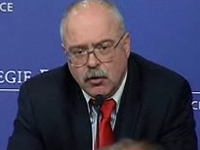Registration
You will receive an email confirming your registration.
As protesters appear on streets in various parts of Russia and the country’s economy continues to falter, it has become clear that the Russian political and economic system is unsustainable in the long run. However, little consensus remains among Russia experts on how to transform the system or on broader issues such as the how the West can effectively reengage Moscow.
To highlight the divergent opinions on Russia's future path, Carnegie hosted a spirited discussion with three leading experts: Donald Jensen, Lilia Shevtsova, and Dmitri Trenin. Ambassador (Retired) James F. Collins moderated the event.
Need for Reform
Trenin began by identifying several recent economic and foreign policy ‘reality checks’ the Russian government has been forced to recognize. They include:
1. The importance of the U.S. to Russia in both positive and negative contexts.
2. The need for foreign investments.
3. The reluctance of former Soviet states to act as Russia’s stooges.
4. The limits of the Russia-China partnership.
Shevtsova explained that the Russian ruling elite is intent on preserving the status quo at the expense of implementing reform. However, she cited growing discontent among second-tier Russian business and political leaders as an indication of an upcoming collapse of Putin’s consensus among the ruling class. While the current Russian system is not sustainable in the long run, Shevtsova argued that a lack of alternatives and a mobilization of anti-Western sentiments (mainly in the anti-American form) could still keep the system running for the next 5-7 years.
International Financial Crisis
Shevtsova recognized that the crisis will help to undermine Russia’s assertive authoritarian foreign policy. But in the short-term it may bring about "a tightening of the screws" within Russia while provoking new tensions with the West as long as the Kremlin continues to consolidate its power within Russia.
Shevtsova further warned that the strengthening of the state in Western countries due to the financial crisis may further be used inside Russia as an excuse to legitimize its own expansion of the traditional Russian state (and a large government presence within the private sectors is the key obstacle to economic reform in Russia). In any case, a solution to the financial crisis in Russia is impossible without reforming the system and introducing competition. However, this is something, that according to Shevtsova, the ruling team is not ready for.
Russia Relations with the West
Shevtsova’s and Trenin’s most serious disagreement came from a differing vision for Western relations with Russia. Shevtsova argued that without a long-term common strategy among Western nations to integrate with Russia, it will never become an effective partner. Russian transformation is impossible without a Western stimulus package that creates incentives for Russian modernization, but that is not tied to democracy promotion policies of the past. The United States, having just elected new leadership that is perceived by the world as a symbol of change, should lead the effort in engaging Russia.
Despite Russia's seemingly contradictory foreign policy, “To be with the West and against the West at the same time” Shevtsova urged that Realpolitik approaches to Russia are counterproductive to changing its behavior. Domestically, they have been skillfully employed by the Kremlin to legitimize the current system, while in the foreign policy field they have led to a worsening in the Russia-West relationship.
Trenin contended that instead of external influences ushering Russia's transformation, change should come from within, beginning with reforms of its financial system, proceeding to other economic sectors, and eventually encompassing the political system. Russia needs closer economic ties to the West, not an economic stimulus package from it. Russia’s integration into the world economy, and the growing exchange of people, and information that would accompany it, would serve as the principal external factor for promoting domestic modernization. Visa-free travel to the EU countries would go farthest in bringing Russians closer to the West.
Russian-Western relations need to be based on values and a strategic vision, but the strategy has to be realistic. The country’s transformation will take a long time. While Russia is currently a country, it is not yet a nation; little solidarity exists among the people and there is no counter-elite. Today, most people support Putin and Medvedev only because they yearn for some kind of order. Over time, the regime will evolve, and perhaps the leaders will eschew reform as a response to the crisis. However, this reform will not deliver “an ideal Russia.” Therefore, the West should consider that even a democratic Russia, when it emerges, will not necessarily be a pliable partner for the United States.
For the U.S. in particular, both Trenin and Jensen agreed that Russia would impose a high cost for its cooperation. Moscow wants to change the rules of the game which were set when it was too weak to participate in rules-setting. Thus there is going to be hard bargaining. While all of the panelists acknowledged that having Russia on board will help U.S.’ interests in Afghanistan and Iran, they warned that Russian contribution to solving those issues is restricted.
Obama’s Presidency
Jensen classified Moscow’s view of Obama as cautiously optimistic. Shevtsova affirmed that assessment but added that the political elite had mixed feelings about Obama, mainly because they are concerned and have doubts about what Obama’s call for change really means and exactly how he will approach Russia. Shevtsova recommended that the President work to engage and transform Russia while containing Russian traditionalists.
Trenin advised a pragmatic approach defined by identifying Russian and U.S. interests to determine where overlap exists.
